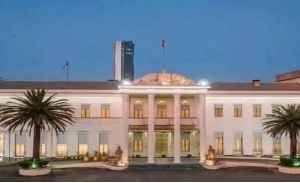In my search for a witness guest I came across a German poet and journalist who is married to an Ethiopian lady and blessed with two bi-racial children. As he uses Amharic words while hitting back with feedbacks to the poems I post on one of the moust famous poetry blogs and as he draws my attention to his knowledge about Ethiopia I asked him to be my witness column guest on this edition.He agreeed and surprised me with an apt and stunning response.
He will relate to us how he saw Ethiopia through the prism of his marriage, children, Ethiopian community abroad,history and the massmedia.
Among others, it is amazing how he described Eskesta.Excerpts:
The Ethiopian Herald: Mikey Kania nice to have you an interviwee on The Ethiopian Herald’s Special Edition.
Mikey: Thank you for the opportunity of being interviewed.
Herald: Did you have an inkling about Ethiopia before you saw it firsthand?
Mikey:Well, let me be honest. I’m German and therefore an inhabitant of a country, which is strongly shaped by the influence of US-American media (news, films, music, etc.). Therefore, I was fed with negative images and stereotypes about Ethiopia, when I was younger. I also heard a lot of cliches about Africa at large. (All countries are extremely poor, all people are suffering from civil wars, corrupt politicians everywhere and so forth). I didn’t believe most of it, so I clearly distinguish between African countries, their quite differing cultures and moral values, while many Europeans don’t do so and tend to generalize the entire African continent).
I would sometimes see tv-reports about young Ethiopian children suffering from hunger. I remember clearly the image of a young girl, kneeing and very thin, flies buzzing around her head.
I barely saw positive tv-reports or read appreciative newspaper articles about Ethiopia. (There was no internet or Youtube yet).
So I didn’t know about the achievements of Emperor Haile Selassie; I had not learnt that Ethiopia is basically the only African country which has never been colonialized.I had also learnt about the strong personality of Haile Selassie. And that therefore Ethiopia poses as a role model for many people of color (e.g. African-Americans) worldwide.
So I would like to offer a counter-image to the thin child. And this is a picture of the once very popular actor Marlon Brando standing across Haile Selassie who was not looking at Brando but with a proud facial expression who was looking into another direction, while you can tell how awestruck Mr. Brando must have been. To the least impressed.
I suppose that Haile Selassie must have had a strong aura around him.
Herald: Have you seen Ethiopia firsthand?
Mikey: I have unfortunately never visited Ethiopia yet, but I am going to do so in 2020 with my Ethiopian-German family. However, I do know many Ethiopians in Frankfurt am Main, my home city in Germany. The biggest Ethiopian community in Germany lives there; close to Frankfurt, in a small city, is where I met my Ethiopian wife, who had been residing there for just two years.
Her name is Beza. She is a gift of God and I mean that by heart. I had never been with a woman before who was able to strenghten me due to her own strong personality. And a woman who is just herself and does not try to be somebody else. There is an African-American idiom for such people, they call them “for real” – a felicitous way to describe an authentic personality.
We have been together for more than seven years and we have two children together. She is a strong believer and a faithful, very good woman.
Herald: What is unique about Ethiopia? What can you say about the people, culture, traditional dishes, costumes and the like?
Mikey: I love Injera. It is one of my favourite dishes and Beza is an amazing cook. Kitfo is delicious as well as Tibes and other ingredients of Ethiopian cusine.
Everytime, when my family and me are invited by our Ethiopian friends, they dance together and by doing so, the Habeshas move their shoulders in a unique way, dancing the Eskista. I seem to be too unflexible to partake in this dance, but I sometimes do. This causes joy and amusement, but never in a mean way; more as a moment of happiness that we all share together.
Moreover, Beza ordered some traditional white costumes for me. Since I am quite tall (1.82 and 106 kilogramm) the costume which she had ordered from Addis, wouldn’t fit me at all, although it was already x-large.
But I’m certain that we will find something for me).
Ah, concerning the parties, it is sometimes frustrating for me when everybody in the room speaks only Amharic for hours, because I am not really good at Amharic. It’s a semitic language, while German stems from Indo-German, so Amharic consists of language patterns that are still quite challenging for me to learn. (Articulation or
the morphology of the words).
My son was baptized in an Ethiopian church. The priest was an Ethiopian man from Sweden, the ceremony took very long, so I experienced how Ethiopians celebrate the worship service. Soon, our daughter will be baptized as well.
Herald: Could you tell us about your children who have Ethiopian blood? Mikey: Yes, our children are Ethiopian-German. Our five-year old son is called Nicholas, his Amharic name is Samuel. His sister’s name is Eden. A couple of years ago, I heard that many Eritrean females as well as some Ethiopian girls are called Eden and I immediately fell in love with this name.
It is one of the most poetic names I know, since it is so strongly connected to the origin of mankind, a garden, the divine paradise. And its articulation is soft, so I find it’s a well chosen name for a girl.
The poem you are alluding on is called “Folk Music” and I wrote it, since our son is only five years old, but maybe he will follow his father’s example in a couple of years. He is a bright boy. (And I’m not saying this because I’m his parent, but due to the way he uses language or memorizes details).
Nicholas descents from the Greek words “Nike” and “Laos”, firstly the godess of victory, the latter means “the people” or “community”.
“Folk Music” is inspired by the Ethiopian names “Berhane” and “Seble” and the meaning of the names which, please correct me if I’m wrong, mean “light” and “harvest”. I have been looking up the etymology of names for years and find a source of creativity in this.
Herald: What do you recommend for Ethiopians?
Mikey: I would love to see that the Amhara and the Oromo would start to tolerate each other more. Unification and peace may be decisive factors for long-term prosperity. And I think both groups could benefit and learn from each other.
Dear Ethiopians, stay as you are and don’t forget about your (Godly) roots, please. It was Beza who brought me closer to God, since many Germans are atheists.
I have a lot of respect for the Habeshas that I got closer to in the last seven years. Much of them put a strong emphasis on their children’s education, which means that they often visit higher schools in Frankfurt. (Our school system is – sadly enough – divides into four types of schools, the most advanced one is called “Gymnasium” and many Habesha-kids go to school there.
As a writer (I also write novels) I observe people, because I want to learn who they are. And what I witnessed is that many Ethiopians simply love their kids and that family cohesion is an essential factor of their way of living.
And that’s what counts more than anything else.
Ethiopian Herald Sunday December 8/2019
BY ALEM HAILU




